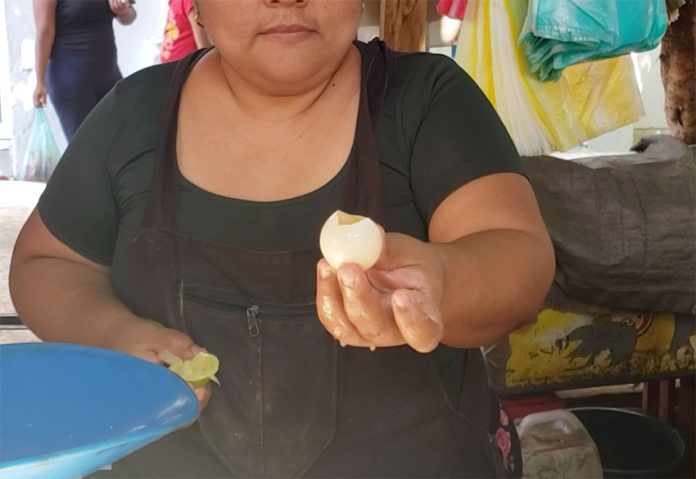Despite a federal ban on the hunting, sale and consumption of sea turtle eggs and meat, the longstanding practice is still tolerated in Juchitán de Zaragoza, located in Oaxaca’s Isthmus of Tehuantepec region.
Vendors sell the eggs by the bag, either fresh or sun-dried, alongside more customary marine fare like fresh red snapper and bright blue crabs.
The ban, which went into effect in 1990, is strictly enforced elsewhere in the Isthmus of Tehuantepec and Oaxaca’s Pacific coast. However, the inhabitants of Juchitán have refused to give up eating turtle eggs, and authorities have come to turn a blind eye to it as long as the commerce stays local.
“Since consumption in Juchitán isn’t large-scale, it’s de facto permitted in town,” said Sara, a local resident who consumes turtle eggs in her home, and preferred not to give her last name. “But outside the city limits, the law is enforced, and if they catch people trafficking turtle eggs, they will arrest them.”
Mexico’s federal penal code imposes a penalty of up to nine years in prison, as well as a fine of up to 300,000 pesos (US $15,300) for the illicit trafficking of sea turtle eggs and/or meat.

Six of the world’s seven sea turtle species come ashore in Oaxaca to lay their eggs, most notably the olive ridley sea turtle. The beaches at La Escobilla, Barra de la Cruz and Morro Ayuta are some of the world’s most important nesting sites for many turtle species.
The olive ridley and other species were classified as endangered in the 1970s, but commercial fishing for sea turtles and harvesting of their eggs in the mid-20th century drastically reduced their arrivals on the beaches of Oaxaca. In the 1980s, the number of nests on Oaxacan beaches fell to as low as 120,000 per season.
Since the ban, however, conservation efforts have reversed that trend, with as many as 4 million turtles coming to nest in a single season in recent years.
Even though the turtles continue to thrive in spite of the localized consumption in Juchitán, conservationists still denounce the practice.
“Unfortunately, there are still cases of turtle egg consumption here in Oaxaca. It’s part of a very old tradition,” said Marcela Chacón, director of the Mexican Turtle Center in Mazunte, Oaxaca, which works to conserve the turtles’ nesting sites along with the National Protected Areas Commission (Conanp), the environmental protection agency (Profepa), and local communities.
“I don’t agree with the tolerance of it in Juchitán. It’s an environmental crime and the federal government is working to regulate those illicit practices.”

For Juchitán’s fishermen and seafood vendors, however, it is a matter of putting food on the table.
“We don’t earn much selling turtle eggs, just enough to get by,” said one egg vendor in the wholesale seafood market who preferred to remain anonymous.
“I agree that we should conserve sea turtles, but the fishermen have to support their families, so if they bring them to us, who are we to refuse to support them?”
In addition to providing for families, it is also an integral part of the proud culture by which the residents of Juchitán have come to identify themselves.
“The eggs are prepared either boiled or sun-dried, and served on crispy tortillas called totopos,” said the anonymous vendor. “Each has a different flavor, and both are delicious.”
“It bothers us that the government tells us not to buy or sell turtle eggs,” she went on to say.

Despite their refusal to fully comply with the federal ban, the people of Juchitán have adapted their tastes and culture in order to partially conform to conservation practices, allowing both the turtles and their traditions to survive.
“These days, when the local fishermen see a turtle in the water, they don’t take it. They let it go on its way,” the vendor said.
“They know that the turtles are an endangered species and that they need to be protected, so they don’t fish for them. We only eat the eggs.”
Mexico News Daily
